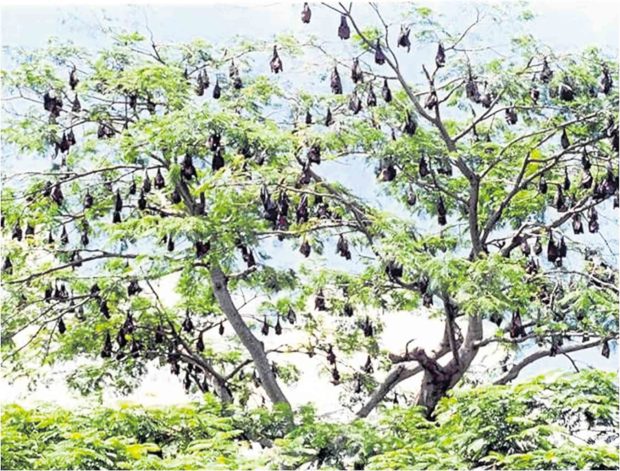
A roosting site of fruit bats on Boracay Island in Aklan province is threatened by the construction of a road that will pass through a forested area in Yapak village. —PHOTO COURTESY OF FRIENDS OF THE FLYING FOXES
ILOILO CITY—The Department of Environment and Natural Resources (DENR) has stopped a private company from clearing a forested area near the roosting site of endangered fruit bats on Boracay Island.
The Provincial Environment and Natural Resources of Aklan also directed Mabuhay Maritime Express Inc., the firm developing the area, to explain why it should not be penalized for violation of Presidential Decree No. 705 (Revised Forestry Code of the Philippines) for cutting 70 trees in a 500-meter stretch without a permit, according to a report of the community environment and resources office on Boracay Island in Malay town.
The firm had applied for a permit to cut the trees for a road connecting the property to the beach, but it bulldozed the area even while the application with the DENR was pending, according to the report.
The clearing of the forest was also done without an environmental compliance certificate (ECC) from the DENR. An ECC certifies that a project or activity will not pose environmental hazards or damage and that its proponents are capable of implementing measures to protect the environment.
The Inquirer on Thursday tried to reach representatives of the company but the DENR and Malay officials could not provide their contact information.
The tree-cutting in the 3.2-hectare private property in Barangay Yapak at the northern end of the 1,032-ha island has drawn protests from conservationists because the area is near the roosting site of the golden-crowned flying fox (Aceradon jubatus).
This species of bat is endemic to the Philippines but has been categorized as among the endangered fruit bats worldwide under the International Union for Conservation of Nature (IUCN) Red List.
A Boracay-based conservation group, Friends of the Flying Foxes (FFF), reported that the number of bats dropped from an estimated 15,000 in 1986 to 2,997, citing the last official count conducted on May 7, 2016.
The significant decline is mainly due to human activity and disturbance in the bats’ habitat, according to FFF.
FFF has been pushing for the maintenance of a 200-meter buffer zone to the nearest roosting site so the bats will not be disturbed.
Human activity, including noise, causes stress to bats which disrupts their sleeping and breeding patterns, among others.
Fruit bats are essential in pollinating plants, including different varieties of fruits and for keeping the insect population under control, according to FFF.